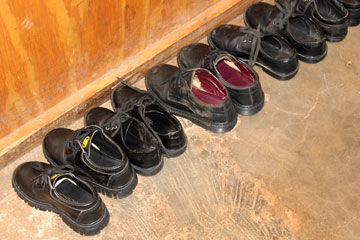Two freezers, balanced precariously on bricks and plastic crates, dominate the room. On one side, huge black pots overlap the plates on a domestic stove. Boxes of fruits scatter atop another box.
Daisy Muskwe bends over and slowly stretches, pulling the lid from one of the three 50-liter buckets to reveal an assortment of groceries. Piled next to the buckets are steel trunks and wooden boxes, their contents unknown.
This is the kitchen for St. Philip Pre-School of the United Methodist Church in Kambuzuma, a densely populated suburb west of Harare, the Zimbabwe capital. The preschool can accommodate 100 children. At the end of the school's first week, 60 children had enrolled, and more parents still were queued for registration.
"We are a ministering church, and we are serving the community and meeting their needs. We are the No. 1 feeder for Lytton Primary School, and it is a blessing that the head of that school sits (on) the preschool board," said the Rev. Remember Masamba, the pastor at St. Philip.
Serves low-income area
The preschool, established in January 2009 with three trained teachers, operates from makeshift facilities partitioned in the church hall. Registered with the government'sMinistry of Education, it conforms torequired health standards.
The children learn through play, following the syllabus from the ministry. "School fees continue to be the lowest in the community but aim at giving the best standards, serving as an evangelism tool," said Mutsa Mupfukwa, the circuit lay leader. The preschool strives to serve the area, which is primarily low- to middle-income earners, and provides free education for as many as 15 orphans.
"The community is realizing that the church is transforming the children, and (as a result), parents have come to join the church," said Tendai Mhembere, trustees chair.
"Children at this school perform better in grade one than (students) from other preschools, and my child has become well disciplined as a result of coming to this place," said Plaxedes Ruzvidzo, the mother of Morrison. "The teachers take good care of our children because they uphold Christian values."
Church members built the church hall that houses the preschool with the support of the Baltimore-Washington Annual (regional) Conference in the United States.
Fundraisers enhance school

Shoes of the preschoolers are lined up awaiting the end of nap time. A UMNS photo by Emmauel Taurai Maforo.
Through various fundraisers, the preschool acquired an 18-seat bus for $11,000. The bus ferries children at an additional cost. The orphans, however, do not pay for the service. Among the efforts to raise money are brewing and selling a traditional energy drink called "mahewu," as well as selling produce, children's mock weddings, dinners and luncheons for couples to renew vows and uniforms.
Professionals from various fields and community stakeholders serve as a board of governors to run the school.
St. Philip continues to be the best in Kambuzuma but faces challenges. The school must equip and fence the outdoor play area, sink a borehole, fit kitchen cupboards, tile the kitchen and bathroom, and put in an industrial stove and children's worktables and dining tables. A solar system is needed to counter the power outages common in Zimbabwe.
Televisions and at least 30 child-friendly computers are required.
"Unfortunately, due to limited funds, the church is not able to take up the education of orphans and vulnerable children to primary school level after preschool graduation," Masamba said.
The church also runs a feeding program for 23 neighborhood children ages 3 to 8. The program formerly included parents, but because of the constrained budget, the program now offers meals to children only during weekdays.
*Chikwanhah, Muzerengwa, Kumuterera and Maforo are communicators for the Zimbabwe Episcopal Area.
News media contact: Tafadzwa Mudambanuki, Nashville, Tenn. (615) 742-5470 or [email protected].
Like what you're reading? Support the ministry of UM News! Your support ensures the latest denominational news, dynamic stories and informative articles will continue to connect our global community. Make a tax-deductible donation at ResourceUMC.org/GiveUMCom.




